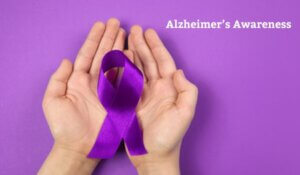
Every September, groups worldwide come together to support fundraising efforts and community events aimed at increasing awareness of the individuals impacted by Alzheimer’s Disease and various forms of dementia. A significant highlight of the month is World Alzheimer’s Day on September 21st. This year marks its 30th anniversary. This first World Alzheimer’s Day was organized by ADI in Edinburgh, Scotland, back in 1994. It has been acknowledged annually ever since.
This year, the campaign aims to change the way many people still wrongly regard dementia as an inescapable result of aging, not as a treatable condition. It will highlight how vital public awareness campaigns are for challenging public perceptions and increasing public knowledge about the associated subjects of Alzheimer’s disease and dementia. The 2024 World Alzheimer’s Month campaign focuses on shifting the public’s understanding, emphasizing that dementia is not a normal part of aging and will center on the taglines “Time to act on dementia, Time to act on Alzheimer’s.”
The global campaign focuses on modifying some of the more common attitudes that people have about dementia and, most significantly, reversing the typical attitude that dementia is somehow not a treatable disease like any other. Unfortunately, in too many areas, public perceptions still foster levels of discrimination and stigmatization for people with these conditions. The campaign also tries to highlight the positive steps being undertaken by organizations and governments globally to develop a more understanding and sympathetic public.
Many individuals still believe that dementia is associated with poor intelligence or a lack of self-control. The focus during Alzheimer’s Month this year aims to raise awareness that Alzheimer’s Disease is a universal phenomenon. It affects individuals from all backgrounds, genders, and races. The onset of the disease can occur at any age. It is increasingly understood that these symptoms stem from processes that are not yet fully comprehended, and it is inaccurate to label Alzheimer’s as solely an ailment of old age.
Recent advancements in research have led to breakthroughs in treatment and support for those affected by the disease. This year’s World Alzheimer’s Month campaign will highlight the importance of supporting individuals diagnosed with the condition, as well as their families and caregivers after diagnosis.
More about Alzheimer’s and Dementia 
It is currently estimated that more than 50 million people are living with dementia throughout the world. This number is predicted to almost triple by 2050, with the most significant increases in low and middle-income countries.
Most people currently living with dementia have never been given a formal diagnosis. Even in advanced countries such as the United States, with sophisticated medical support, less than half of dementia cases have been recognized and documented in primary care. The treatment gap is bound to be much more significant in low and middle-income countries. One study suggests that nine out of ten people in India with the condition remain undiagnosed. Suppose these statistics are extrapolated to countries worldwide. In that case, it indicates that approximately three-quarters of all the people with symptoms of mild dementia have not been diagnosed or given access to treatment or care.
The leading causes of dementia include:
- Alzheimer’s Disease
- Huntington’s disease
- Creutzfeldt–Jakob disease
- High-pressure hydrocephalus
- Frontotemporal dementia
- Vascular dementia
- Parkinson’s disease dementia
- HIV-associated dementia
- Traumatic brain injury
- Structures called amyloid plaques and tangles that aggregate in the spaces between brain cells in the areas of the brain dealing with memory and other cognitive functions.
According to the National Institute on Aging,” people who develop Alzheimer’s do not always have a history of the disease in their families. Still, those who have a parent or sibling diagnosed with the disease have a higher risk of developing Alzheimer’s than those without that association.”
Dementia describes various brain disorders that affect behavior, memory, thinking, and emotion.
- Early symptoms of dementia can include personality changes, difficulty performing familiar tasks, memory loss, and problems with language.
- There is currently no cure for dementia, but a range of support is available for people with dementia and their carers.
- Dementia knows no social, economic, or ethnic boundaries
- Already, 60% of people with dementia symptoms live in low and middle-income countries. It’s projected that this will rise above 70% by 2050.
Some other troubling statistics that are part of the more prominent reason for campaigns like Alzheimer’s Disease Awareness Month are:
- A new case of dementia affects a person somewhere in the world every three seconds.
- The attitudes of the general public show that while the great majority of people (80% or more) are at least somewhat concerned about the risk of developing Alzheimer’s at some point in their lives, most of them take no positive action in their daily life in preparation for this possibility, mainly because they think that there is nothing that can be done to prevent dementia.
- A study has shown that more than one-half of all healthcare professionals still incorrectly regard dementia as being part of normal aging and so do not actively try to either increase their knowledge about the condition or to provide proactive healthcare to their patients.
- A significant proportion of the paid carers for people showing symptoms of cognitive decline are hiding the signs of dementia from members of the patient’s family because of the negative effect this could have on the whole social environment.
Progress in Treating Alzheimer’s Disease
Thanks to extensive research, there is progress being made that could eventually turn the current general attitude of accepting the inevitability of dementia into a real fight to improve the consequences and incidence of the condition. One of the most promising findings was published recently in The Lancet, which concluded that “the Lancet Commission on Dementia estimates that close to 50% of cases of dementia worldwide can be prevented or delayed by improving 14 modifiable risk factors.” What it indicates is that what is necessary is the same approach that was adopted in some other conditions, like type 2 diabetes, coronary heart disease, and some forms of cancer: Stop smoking! Consume less cholesterol! Stay fit! While the disease may be incurable, its incidence and progress can be reduced by simple steps.
The research is now pointing to some similar barriers to the onset and progress of dementia. Two stand-outs are the relationships between early Alzheimer’s, elevated LDL cholesterol levels, and untreated vision loss. Thanks to overall progress in medicine, both of these are quite easily treatable. If they were applied universally, there is a good chance that the overall goals of Alzheimer’s Disease Awareness campaigns would be achieved sooner and at a lower cost.
FAQ
What is the number one trigger for dementia behavior?
Changes in behavior often come from disruptions in the environment or daily routine. Individuals with Alzheimer’s Disease may feel disoriented and bewildered when faced with alterations in their lives. This could involve relocating to a residence, changing their care providers, or even adjusting their daily timetable. These shifts can result in heightened feelings of anxiety, restlessness, or other challenging behaviors as individuals struggle to comprehend their surroundings.
At what stage do Alzheimer’s patients forget family members?
The inability to remember family members more often manifests during the advanced stages of Alzheimer’s Disease. In these stages, the gradual loss of brain cells, particularly in areas linked to memory function, can lead to substantial memory impairment. It may cause individuals with Alzheimer’s to have difficulty recognizing immediate family members as their ability to relate these images to past events and connections deteriorates. Although this stage is profoundly distressing for both the patient and those around them, it is crucial to acknowledge that individuals with Alzheimer’s still benefit from the affection and care they receive even if they are no longer able to express recognition.
Does a person with Alzheimer’s know they are confused?
Many individuals experiencing the initial phases of dementia have some awareness of their confusion. Being aware of their memory and cognitive struggles can generate frustration, anxiety, and even depression. They may notice that tasks they once found easy to complete are now challenging or realize that they are frequently forgetting things. However, as the disease advances and their cognitive abilities decline further, they may become less conscious of their confusion. This change poses a challenge in caregiving, requiring empathetic and supportive approaches to help them manage their condition.

















